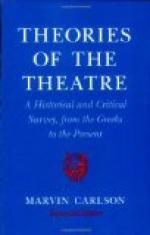The drama is a more popular art than the novel, in the sense that it makes its appeal not to the individual but to the populace. It sets a contest of human wills before a multitude gathered together for the purpose of witnessing the struggle; and it must rely for its interest largely upon the crowd’s instinctive sense of partisanship. As Marlowe said, in Hero and Leander,—
When two are stripped, long
e’er the course begin,
We wish that one should lose,
the other win.
The audience takes sides with certain characters against certain others; and in most cases it is better pleased if the play ends in a victory for the characters it favors. The question therefore arises whether the dramatist is not justified in cogging the dice of chance and intervening arbitrarily to insure a happy outcome to the action, even though that outcome violate the rigid logic of the art of narrative. This is a very important question; and it must not be answered dogmatically. It is safest, without arguing ex cathedra, to accept the answer of the very greatest dramatists. Their practice goes to show that such a violation of the strict logic of art is justifiable in comedy, but is not justifiable in what we may broadly call the serious drama. Moliere, for instance, nearly always gave an arbitrary happy ending to his comedies. Frequently, in the last act, he introduced a long lost uncle, who arrived upon the scene just in time to endow the hero and heroine with a fortune and to say “Bless you,




